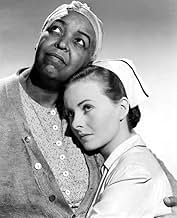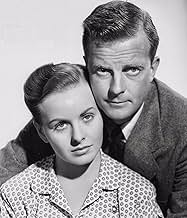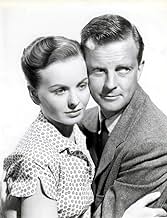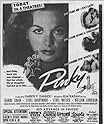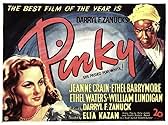CALIFICACIÓN DE IMDb
7.2/10
3.6 k
TU CALIFICACIÓN
Una enfermera negra de piel clara regresa a su pueblo y debe cuidar a una anciana maestra muribunda.Una enfermera negra de piel clara regresa a su pueblo y debe cuidar a una anciana maestra muribunda.Una enfermera negra de piel clara regresa a su pueblo y debe cuidar a una anciana maestra muribunda.
- Dirección
- Guionistas
- Elenco
- Nominado a 3 premios Óscar
- 3 premios ganados y 4 nominaciones en total
Fred Aldrich
- Townsman
- (sin créditos)
Shelby Bacon
- Boy
- (sin créditos)
Betty Beard
- Minor Role
- (sin créditos)
Rene Beard
- Teejore
- (sin créditos)
Arthur Berkeley
- Townsman
- (sin créditos)
Patsy Boniface
- Minor Role
- (sin créditos)
Mildred Boyd
- Nurse
- (sin créditos)
Opiniones destacadas
Elia Kazan took over the helm of PINKY when John Ford requested replacement as having no real interest in the story. He not only took over, but he did a superb job.
Personally, it took awhile for me to get over the idea of casting JEANNE CRAIN as a light-skinned black, but she does some of her best work here. Same can be said of Ethel Waters and Ethel Barrymore, and not surprisingly, all three actresses were nominated for Oscars. Undoubtedly, all benefited by Kazan's firm direction.
The story is essentially written to show the racial bigotry that existed (and still does) in many parts of the South. Without going into plot development, let's say the ending is a bit predictable, but the film still remains powerful and sensitive in its treatment of the subject matter.
In 1949, this was a daring film for Fox to make, risking the possibility of hurting the reputation of its most popular box-office star at that time, Jeanne Crain. But credit goes to Darryl F. Zanuck for permitting his studio to make films like THE SNAKE PIT and GENTLEMAN'S AGREEMENT, risky and controversial. The box-office results and critical acclaim justified the risk.
Well worth seeing, absorbing and sensitive.
Personally, it took awhile for me to get over the idea of casting JEANNE CRAIN as a light-skinned black, but she does some of her best work here. Same can be said of Ethel Waters and Ethel Barrymore, and not surprisingly, all three actresses were nominated for Oscars. Undoubtedly, all benefited by Kazan's firm direction.
The story is essentially written to show the racial bigotry that existed (and still does) in many parts of the South. Without going into plot development, let's say the ending is a bit predictable, but the film still remains powerful and sensitive in its treatment of the subject matter.
In 1949, this was a daring film for Fox to make, risking the possibility of hurting the reputation of its most popular box-office star at that time, Jeanne Crain. But credit goes to Darryl F. Zanuck for permitting his studio to make films like THE SNAKE PIT and GENTLEMAN'S AGREEMENT, risky and controversial. The box-office results and critical acclaim justified the risk.
Well worth seeing, absorbing and sensitive.
Black people "passing for white" was not a new topic for Hollywood in 1949. It was part of the plot of "Imitation of Life" in 1934, but in that film, an actual black actress, Fredi Washington, played the role of the young woman who "passes" in the white world. In 1949, there were two films dealing with this issue: "Pinky" and "Lost Boundaries," and in both cases, the black person was played by a white actor.
"Pinky" stars Jeanne Crain as Pinky Johnson, a black woman who looks white, so much so that she when she studies nursing in New York, she easily enters the white world and becomes involved with a white doctor who wants to marry her. Needing time to think over her situation, she returns home, which is a shack where her grandmother (Ethel Waters) lives in a black section of their southern town. There she is reminded of the prejudice and cruelty she left. When her grandmother asks her to care for an elderly white woman (Ethel Barrymore), hostility between patient and nurse leads to an uneasy bond.
This is a brilliant film all the way, magnificently directed by Elia Kazan and produced by Darryl F. Zanuck, who loved taking on these controversial social issues. The acting is superb: Jeanne Crain gives the best performance of her career as a woman who comes to grips with her true identity. She is so dignified as she walks through the town, soft-spoken yet strong, refusing to come down to the level of those around her. Ethel Barrymore is the elderly terminally ill woman Pinky reluctantly agrees to care for, and she nearly steals the movie with a no-nonsense performance. She's a woman set in her ways and opinions, but she's fair person who can see the human soul. It's probably the best drawn character in the film.
As a teen-aged fan of "Route 66," I can well remember the publicity around the show when Ethel Waters guest-starred. Of course white teens in the '60s had no idea of who she was or the circumstances of her life and career. Yet to this day I can remember her on that show. Forty years later, thankfully, I have an appreciation of her place in history and her work. Waters gives a powerful performance. Her character has accepted her lot in life but sacrifices everything so that her grandchild can have a better one. In her world, white men have the power, and you can clearly see her belief manifested in her courtroom demeanor.
The casting of Jeanne Crain is a sticking point here but not really when looked at in the context of the 1940s. Even with this casting, this is a bold movie, uncompromising in its depiction of white attitudes and racial slurs. It is just a pity that at the time of the filming, Fredi Washington was 45 years old and actually no longer in films. Washington looked so white that she was told by producers that if she would agree to "pass" and play white roles, she could have a career equal to that of Norma Shearer. She refused, and in order to play black women, she had to darken her skin. Lena Horne was deemed not white-looking enough. I suggest that the same is true for the beautiful Dorothy Dandridge. There may have been black actresses who looked white enough to play this role, but would anyone have answered such a casting call? Most importantly, "Pinky" would not have been made without Jeanne Crain, because Zanuck wanted her to do it, and it's a film that deserved making. The other sticking point in the film is Pinky's fiancée, a white doctor. His easy acceptance of her as black - and the fact that she kept it from him - is a weakness in the script. This was done perhaps to highlight that he wanted to her to continue to pass for white, therefore making it clear that Pinky has to the make the decision, but the scenario does not seem believable.
You can predict the ending of "Pinky," and despite complaints that it's a typically neat Hollywood one, I found it immensely satisfying as I found the entire experience of watching this truly classic film, "Pinky."
"Pinky" stars Jeanne Crain as Pinky Johnson, a black woman who looks white, so much so that she when she studies nursing in New York, she easily enters the white world and becomes involved with a white doctor who wants to marry her. Needing time to think over her situation, she returns home, which is a shack where her grandmother (Ethel Waters) lives in a black section of their southern town. There she is reminded of the prejudice and cruelty she left. When her grandmother asks her to care for an elderly white woman (Ethel Barrymore), hostility between patient and nurse leads to an uneasy bond.
This is a brilliant film all the way, magnificently directed by Elia Kazan and produced by Darryl F. Zanuck, who loved taking on these controversial social issues. The acting is superb: Jeanne Crain gives the best performance of her career as a woman who comes to grips with her true identity. She is so dignified as she walks through the town, soft-spoken yet strong, refusing to come down to the level of those around her. Ethel Barrymore is the elderly terminally ill woman Pinky reluctantly agrees to care for, and she nearly steals the movie with a no-nonsense performance. She's a woman set in her ways and opinions, but she's fair person who can see the human soul. It's probably the best drawn character in the film.
As a teen-aged fan of "Route 66," I can well remember the publicity around the show when Ethel Waters guest-starred. Of course white teens in the '60s had no idea of who she was or the circumstances of her life and career. Yet to this day I can remember her on that show. Forty years later, thankfully, I have an appreciation of her place in history and her work. Waters gives a powerful performance. Her character has accepted her lot in life but sacrifices everything so that her grandchild can have a better one. In her world, white men have the power, and you can clearly see her belief manifested in her courtroom demeanor.
The casting of Jeanne Crain is a sticking point here but not really when looked at in the context of the 1940s. Even with this casting, this is a bold movie, uncompromising in its depiction of white attitudes and racial slurs. It is just a pity that at the time of the filming, Fredi Washington was 45 years old and actually no longer in films. Washington looked so white that she was told by producers that if she would agree to "pass" and play white roles, she could have a career equal to that of Norma Shearer. She refused, and in order to play black women, she had to darken her skin. Lena Horne was deemed not white-looking enough. I suggest that the same is true for the beautiful Dorothy Dandridge. There may have been black actresses who looked white enough to play this role, but would anyone have answered such a casting call? Most importantly, "Pinky" would not have been made without Jeanne Crain, because Zanuck wanted her to do it, and it's a film that deserved making. The other sticking point in the film is Pinky's fiancée, a white doctor. His easy acceptance of her as black - and the fact that she kept it from him - is a weakness in the script. This was done perhaps to highlight that he wanted to her to continue to pass for white, therefore making it clear that Pinky has to the make the decision, but the scenario does not seem believable.
You can predict the ending of "Pinky," and despite complaints that it's a typically neat Hollywood one, I found it immensely satisfying as I found the entire experience of watching this truly classic film, "Pinky."
It is not very "in" to like Elia Kazan right now, because he named names in the McCarthy witch-hunts and just received an honorary Oscar, but what a brilliant director he was. And if he didn't show much courage in the Fifties, he sure did in the Forties when he tackled racial prejudice head-on in two excellent movies: "Gentleman's Agreement" and "Pinky" (John Ford is said to have chickened-out of directing this one). "Pinky" is not as good as "Gentleman's Agreement", but it ain't half bad either. Here we see a deeply prejudiced South where black girls are attacked on the streets and shops refuse them service. The scenes are realistic, even brutally filmed, and the language strong for its day.
I'm sure Kazan must have been dismayed to have been given a Hollywood starlet to play the complex lead character - a black woman who looks white - but he managed to extract a damn good performance out of Jeanne Crain. The supporting cast is flawless, down to the smallest role. Kazan knew how to direct actors. Evelyn Varden deserves special mention as a vicious Southern matron. But the most praise must be reserved for the two Ethels - Waters and Barrymore - who are nothing short of brilliant.
Okay, the ending's a little dicky, and predictable, but the intentions of the film-makers are sincere and the results must have been revolutionary in 1949. I love the way Kazan shoots his movies too - long unbroken sequences and tracking shots, and excellent use of light and shadow - both of which probably coming from his stage experience. Kazan combined a strong ability to work with actors and a keen cinematic eye to create some of the best dramatic films of the century. And "Pinky" is one of these.
I'm sure Kazan must have been dismayed to have been given a Hollywood starlet to play the complex lead character - a black woman who looks white - but he managed to extract a damn good performance out of Jeanne Crain. The supporting cast is flawless, down to the smallest role. Kazan knew how to direct actors. Evelyn Varden deserves special mention as a vicious Southern matron. But the most praise must be reserved for the two Ethels - Waters and Barrymore - who are nothing short of brilliant.
Okay, the ending's a little dicky, and predictable, but the intentions of the film-makers are sincere and the results must have been revolutionary in 1949. I love the way Kazan shoots his movies too - long unbroken sequences and tracking shots, and excellent use of light and shadow - both of which probably coming from his stage experience. Kazan combined a strong ability to work with actors and a keen cinematic eye to create some of the best dramatic films of the century. And "Pinky" is one of these.
Well-mannered nurse Jeanne Crain (as Patricia "Pinky" Johnson) returns to her poor "Black" neighborhood, in Mississippi. There, she is welcomed by washerwoman grandmother Ethel Waters (as Granny). The pair are confronted by racism both outside and inside their home. Most importantly, it is revealed that Ms. Crain has been "passing" as "White". Moreover, Crain has become engaged to Caucasian doctor William Lundigan (as Thomas Adams). While working at home, to support Crain's nursing education, Ms. Waters has grown close to ailing Ethel Barrymore (as Miss Em). At first, Crain does not understand or accept the friendship between Waters, a former slave, and Ms. Barrymore, a former plantation owner. But, for her grandmother, Crain agrees to become Barrymore's nurse.
"Pinky" is a nerve-rattling classic.
Probably, the most obvious "debate" point was the casting of Crain in the title role. Crain was definitely "pink" enough (or, white-looking); but, her general "movie star" persona makes the casting decision seem risky. Yet, Crain, under Elia Kazan's direction, triumphs. There are so many ways Crain could have fallen into acting traps - she could have used mannerisms, make-up, and/or other stereotypical devices to "camp" up the "Black" - but, she avoids each trap. Crain performs the role with a great amount of dignity. She was deservedly honored with an "Academy Award" nomination.
Barrymore and Waters also perform well (as you might expect).
We are never, in the film, given a clear statement of facts regarding the heritage of Crain's "Pinky". My guess is that she is related, by blood, to both Waters and Barrymore. An attempted rape of Crain's character accounts, arguably, for her pink appearance; this might have occurred in more than one generation. It's also possible that a loving "mixed race" relationship was part of either Ethel's past. Making the "Black/White" history more clear would have only gotten the film into more trouble.
"Pinky" was quickly censored, and headed for the US Supreme Court.
One of the Board of Censors' objections was, "a white man retaining his love for a woman after learning that she is a Negro." However, Mr. Lundigan's "Thomas" is only willing to retain his love under certain conditions; and, this leads to a sharp, less "Hollywood"-styled ending. The Supreme Court was correct. Some of the film's best scenes show the way Crain is treated after other characters learn she is not white.
********* Pinky (9/29/49) Elia Kazan ~ Jeanne Crain, Ethel Barrymore, Ethel Waters, William Lundigan
"Pinky" is a nerve-rattling classic.
Probably, the most obvious "debate" point was the casting of Crain in the title role. Crain was definitely "pink" enough (or, white-looking); but, her general "movie star" persona makes the casting decision seem risky. Yet, Crain, under Elia Kazan's direction, triumphs. There are so many ways Crain could have fallen into acting traps - she could have used mannerisms, make-up, and/or other stereotypical devices to "camp" up the "Black" - but, she avoids each trap. Crain performs the role with a great amount of dignity. She was deservedly honored with an "Academy Award" nomination.
Barrymore and Waters also perform well (as you might expect).
We are never, in the film, given a clear statement of facts regarding the heritage of Crain's "Pinky". My guess is that she is related, by blood, to both Waters and Barrymore. An attempted rape of Crain's character accounts, arguably, for her pink appearance; this might have occurred in more than one generation. It's also possible that a loving "mixed race" relationship was part of either Ethel's past. Making the "Black/White" history more clear would have only gotten the film into more trouble.
"Pinky" was quickly censored, and headed for the US Supreme Court.
One of the Board of Censors' objections was, "a white man retaining his love for a woman after learning that she is a Negro." However, Mr. Lundigan's "Thomas" is only willing to retain his love under certain conditions; and, this leads to a sharp, less "Hollywood"-styled ending. The Supreme Court was correct. Some of the film's best scenes show the way Crain is treated after other characters learn she is not white.
********* Pinky (9/29/49) Elia Kazan ~ Jeanne Crain, Ethel Barrymore, Ethel Waters, William Lundigan
I saw this film some years after it came out, in a Texas Baptist orphans home, as a preadolescent. In the years to follow, I developed a fascination for Ethel Waters, esp. when I saw her interpretation of Carson McCuller's "A Member of the Wedding".
When I saw the film tonight on American Movie Classics, a lot of years had passed since first having seen it. Ethel Waters' performance struck me as cowed and subservient. In the court scene while being questioned by the plaintiff's council, she actually flinched when he raised his voice. ...And I'm thinking, 'Damn, that woman is really intimidated.' Having read her autobio, as well as a bio on her, I'm aware that not one woman in a million suffered through a similar childhood: a b*****d born of a 13-year-old rape victim - unwanted and shuffled from pillar to post to eventually become a washerwoman...it's a wonder she survived.
Yet survive she did. Not surprisingly, she had a monster chip on her shoulder. It is my understanding that John Ford, the man who was to direct "Pinky", had such a run-in with Miss Waters that he quit, and Kazan took over. The word is that neither could stand the sight of the other.
The movie is an important one - and I'd like to think that the reason goes beyond the juxtapositioning of America's treatment of blacks in the Forties with today's suffocating PC standards. There is the understated acting, for one thing. Ethel Barrymore always played the dignified albiet intimidating elderly lady in her later years. Yet in "Pinky", she is strong without being absurdly powerful. How well that woman delivers her lines...!
What I also liked was, while the white majority were unkind to Pinky, I can attest as a Southerner (well, Texan), that Kazan presented them truthfully. He only demonized one woman: the older cousin-plaintiff.
It is surprising that this film wasn't presented in a more gritty format; that there wasn't more preaching in it, that it wasn't condescending to whites. None of these failings mar this splendid film. Forty years after having seen it, I realize a superb gentleness that isn't to be found in American films. At a guess, that's because a generation ago most films were made for 30-and-over adults, whereas today they're almost exclusively made for 13 - 25 year olds.
I will give "Pinky" my highest compliment: It is literary.
When I saw the film tonight on American Movie Classics, a lot of years had passed since first having seen it. Ethel Waters' performance struck me as cowed and subservient. In the court scene while being questioned by the plaintiff's council, she actually flinched when he raised his voice. ...And I'm thinking, 'Damn, that woman is really intimidated.' Having read her autobio, as well as a bio on her, I'm aware that not one woman in a million suffered through a similar childhood: a b*****d born of a 13-year-old rape victim - unwanted and shuffled from pillar to post to eventually become a washerwoman...it's a wonder she survived.
Yet survive she did. Not surprisingly, she had a monster chip on her shoulder. It is my understanding that John Ford, the man who was to direct "Pinky", had such a run-in with Miss Waters that he quit, and Kazan took over. The word is that neither could stand the sight of the other.
The movie is an important one - and I'd like to think that the reason goes beyond the juxtapositioning of America's treatment of blacks in the Forties with today's suffocating PC standards. There is the understated acting, for one thing. Ethel Barrymore always played the dignified albiet intimidating elderly lady in her later years. Yet in "Pinky", she is strong without being absurdly powerful. How well that woman delivers her lines...!
What I also liked was, while the white majority were unkind to Pinky, I can attest as a Southerner (well, Texan), that Kazan presented them truthfully. He only demonized one woman: the older cousin-plaintiff.
It is surprising that this film wasn't presented in a more gritty format; that there wasn't more preaching in it, that it wasn't condescending to whites. None of these failings mar this splendid film. Forty years after having seen it, I realize a superb gentleness that isn't to be found in American films. At a guess, that's because a generation ago most films were made for 30-and-over adults, whereas today they're almost exclusively made for 13 - 25 year olds.
I will give "Pinky" my highest compliment: It is literary.
¿Sabías que…?
- TriviaJohn Ford was the original director of the film but after seeing dailies, Darryl F. Zanuck felt Ford wasn't connecting with the material. Zanuck called Elia Kazan in New York and asked him to take over the film. Kazan felt he owed Zanuck for his film career and agreed to do the movie without even looking at the script. He flew to Los Angeles and started filming the next Monday.
- ErroresWhen the white officer slaps Rozelia on the left side of her face, she mistakenly rubs the right side of her face.
- Citas
Pinky Johnson: I'm a Negro. I can't forget it, and I can't deny it. I can't pretend to be anything else, and I don't want to be anything else. Don't you see, Tom?
Dr. Thomas Adams: No, I don't.
Pinky Johnson: You can't live without pride.
- ConexionesFeatured in Biography: Darryl F. Zanuck: 20th Century Filmmaker (1995)
Selecciones populares
Inicia sesión para calificar y agrega a la lista de videos para obtener recomendaciones personalizadas
- How long is Pinky?Con tecnología de Alexa
Detalles
Taquilla
- Total en EE. UU. y Canadá
- USD 4,200,000
- Tiempo de ejecución1 hora 42 minutos
- Color
- Relación de aspecto
- 1.37 : 1
Contribuir a esta página
Sugiere una edición o agrega el contenido que falta

Principales brechas de datos
By what name was Lo que la carne hereda (1949) officially released in India in English?
Responda

